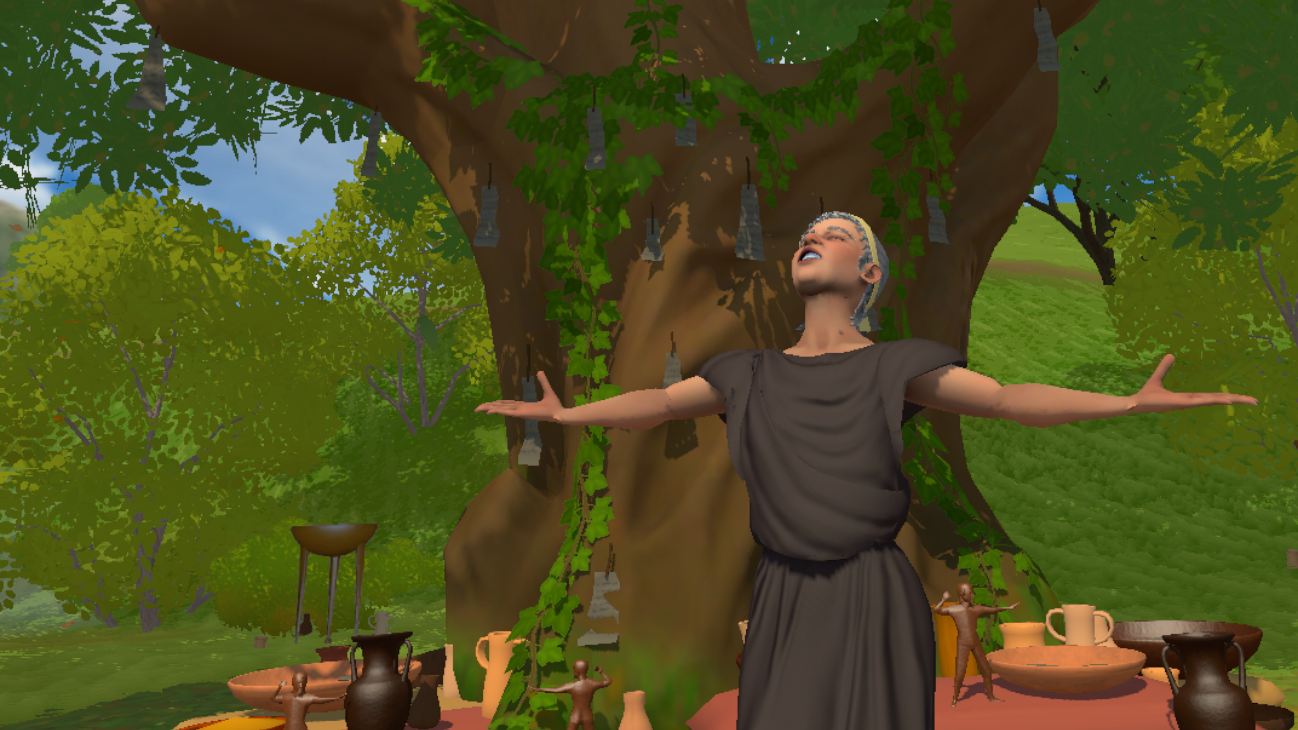On Friday 12 May, the Virtual Reality Oracle project hosted an international, multidisciplinary workshop on Virtual Realities as Time Travel at the University of Bristol and online.
Virtual Realities as Time Travel brought together speakers from the project team and from across academic disciplines and industry to explore how users and producers of VR experiences and historical video games conceive of journeying to the past.
 Virtual Reality Oracle Project, Esther Eidinow, Kirsten Cater, et al, with Friday Sunday Studios, funded by AHRC, University of Bristol.
Virtual Reality Oracle Project, Esther Eidinow, Kirsten Cater, et al, with Friday Sunday Studios, funded by AHRC, University of Bristol.
This event was organised by Richard Cole, in collaboration with Chris Bevan, Elisa Brann, Crescent Jicol and Emilia Tor. The workshop was sponsored by the Bristol Digital Game Lab and the Centre for Creative Technologies.
The event attracted over 100 signups, with around 40 people attending the event in person at Bristol’s Centre for Innovation and Entrepreneurship, and 54 on Zoom.
Esther Eidinow (Bristol) kicked off the day with an overview of the Virtual Reality Oracle project. Esther discussed how virtual reality has helped to imagine a visit to the oracle of Zeus at Dodona, c. 465 BCE. Richard Cole (Bristol) followed with an exploration of how game and VR developers often frame the experience of their worlds as a form of time travel, as well as how feedback on these experiences frequently draws on the same terminology.

The remainder of the day was divided into the following panels: Playing with Time, Facilitating Time Travel, Connecting Past and Present, and Producing Historical Experiences.
In the first panel, Alexander Vandewalle (Antwerp/Ghent) suggested that rather than thinking of time travel, a more useful way to understand what historical games offer is to think about them as a form of time tourism. Bettina Bodi (Leeds Becket) refocused attention on the player as an active agent in playing with the temporal structures of game worlds, and looked at how cosy games complicate the idea of temporality in games when compared to fast-paced play.

Robert Houghton (Winchester) took the audience on a tour back to late antiquity with a paper on Total War: Attila. By deploying innovative strategy game mechanics, Robert argued that Total War: Attila attempts to create an experience of a truly Dark Age. From console to phone, Kate Cook (St Andrews) went on to explore how certain design features, such as microtransactions, alter the player’s relationship with time in mobile games.
After lunch, Jack Lowe (UWE) charted how location-based games engage with place. Jack suggested that the relationship with the past in such games is more a form of wayfinding than time travel.

Following Jack’s talk, workshop attendees were treated to two industry presentations. The first, from Leyla Johnson (Mokawk Games), demonstrated how developers can turn a historical era, leader, or event into a game system. Using Mokawk’s Old World as an example, Leyla emphasised how this approach could be used to incorporate a diverse range of historical material. The second industry speaker, Stéphanie-Anne Ruatta (Ubisoft), delivered a richly illustrated presentation on the experience of using historical source material to create the world of Assassin’s Creed Odyssey. Stéphanie-Anne showed how historical research served as a foundation for many of the facets of the game experience, thus creating ‘time travelling’ opportunities for the player.
Dooley Murphy (Copenhagen) rounded off the workshop with a paper on his project Hans Christian and I, which uses VR, not to recreate Hans Christian Andersen’s life, but to explore facets of his character.

The Virtual Reality Oracle project team would like to extend their thanks to all the speakers, Chairs, and to Claudia Jones at the Bristol Digital Game Lab for her excellent work overseeing the hybrid format of the workshop, which was praised by participants for opening up access to the event.
Plans are underway for a publication inspired by the workshop. Watch this space!

